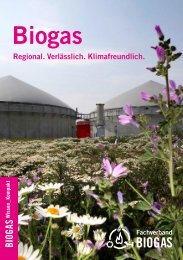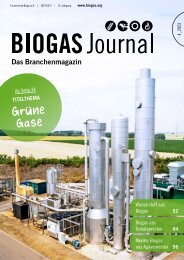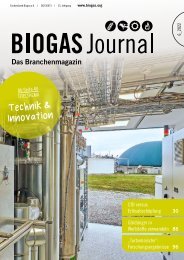Biogas Safety first!
You also want an ePaper? Increase the reach of your titles
YUMPU automatically turns print PDFs into web optimized ePapers that Google loves.
Upgrading of biogas to biomethane
When work is carried out on the gas installation it
must be safely depressurised to the open air and
must be inerted. A clearance measurement should
be carried out prior to work on the gas installation
in order to rule out hazardous Ex zones. Following
maintenance / repair work and prior to resumption of
operation, the relevant unit should be subjected to
a leak test and functional test. The necessary tests
must be performed by qualified professionals and
must be documented. If necessary, oxygen contained
in the gas system must be removed and the system
must be flushed with process gas prior to resumption
of operation. The resumption of operation must be
agreed and coordinated with the persons responsible
for the upstream and downstream parts of the plant.
Only approved specialised companies/skilled workers
are permitted to perform welding work on pipes
and gas-carrying systems. Detailed descriptions of
equipment, devices, procedure testing, performance
of the welding work and testing of the weld are given
in national regulations (in Germany: DVGW GW 350
and G472). Welding work on gas-carrying plant parts
is not permitted in installation rooms (exceptions
may be possible if justified).
The relevant national regulations must be observed
when work is carried out on pressurised plant parts.
Organisational protective measures
If condensate is expected to arise, the pipes and
condensate discharge systems must be regularly
maintained and cleaned. Pipes above ground level
must be checked for leaks on an annual basis.
Shorter intervals should be planned for compensators
and other specialised components where necessary
(hazard assessment). Every two years pipes laid
above ground (including pipe protection) should be
checked to ensure that they are in good condition
and for external corrosion. If necessary, the UV protection
of plastic pipes should be repaired.
Biomethane plants and their components must be
maintained and serviced in accordance with the
manufacturer’s instructions (method, intervals
etc.). Essentially a distinction is drawn between
three types of maintenance:
planned maintenance (fixed intervals)
condition-based maintenance (after assessment
of the state of the plant)
corrective maintenance (initiated because a
fault has arisen)
Before any maintenance work is carried out, an
individual hazard assessment is required, with
specified protective measures. This must be
agreed with all plant operators (biogas production,
cleaning, conditioning and injection).
All persons assigned to perform maintenance work
on the installations must be qualified, approved and
reliable and must have received special instruction.
This applies both to the plant’s own staff and to external
companies and workers. German regulations
require, for example, that certain activities, namely
functional testing, maintenance, repair and resumption
of operation, must always be performed by two
persons, at least one of whom must have the necessary
expertise and the other must at least have received
relevant instruction.
Maintenance and repair work should be systematically
prepared. This means that necessary protective
equipment (e.g. respiratory protection, warning devices,
fire extinguishers etc.) must be made available.
It is also advisable to draw up a work programme
and overview plan in which all relevant activities and
plant components are plainly apparent. Where necessary,
automated processes in the system should be
switched to manual operation before maintenance or
repair work is carried out.
An individual person must be named as being responsible
for safe operation and the safety of the
plant, and be granted the necessary powers. To avert
danger, an on-call service must be arranged at the
plant itself or through an external service provider
so that constant standby backup service is ensured
(24 h/7 days). In Germany, for example, the on-call
service must be present at the plant within max. 30
minutes in order to be able to respond to faults in
good time.
Instrumentation and control (I&C) systems must be
checked by a qualified professional at least once a
year and after each maintenance operation to ensure
that they are in working order. The operator of the
plant must draw up a test plan for this purpose.
All tests, measurement reports etc. must be documented
in writing or electronically and kept as long
as necessary (at least two maintenance intervals).
Structural changes at the plant must be documented.
Other tests must be performed in accordance
with the general test requirements for biogas plants
(electrical safety, explosion protection etc.).
57


















